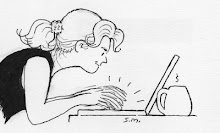Piles of clean t-shirts with logos on them—"CSI," "I'm not dead yet," "Deny everything"—sit patiently on the floor beside the black duffel. Several multicolored ballpoint pens are scattered on the rug. A small plastic turkey waits to be packed. In the middle of it all, our gigantic sheep-cat sits on his scratching board, waiting. (Just waiting. Nothing much goes on in his head, so just waits for stimulus, preferably of the edible variety.)
Tomorrow's the day we fly to New York; on Wednesday we'll rent a car and drive up to the college town. Thursday is move-in day. Friday is orientation, both for students and for parents. The kids will have bonding exercises and small-group discussions. The parents will receive grief counseling. I'm kidding, I think.
This afternoon we visited with my parents and my sister and her family. We celebrated my brother-in-law's birthday, ate El Pollo Loco chicken and apple pie. The younger kids swam in the pool. Just like normal, except for the one tiny thing that was different.
On the way home, my daughter and I stopped for a visit at the Getty Center, one of her favorite places in L.A. When we got off the tram, she borrowed my iPhone to start taking pictures of the angles and textures and plays of light on the marble. Today, L.A. was burning up, and the smoke clouds billowed dramatically behind the architecture. She took a picture.

In a way, this is what the whole day was like: a pleasant time, with this gigantic thing looming in the background.
We leave tomorrow, together. I come back alone next Sunday.
Yes, and how do you feel about this, Susan? I feel...honestly, I don't know anymore. I'm not weeping. I've made it through the last dinner-we'll-eat-at-this-table and the last-episode-of-"Psych"-we'll-watch-on-this-TV. I did the dishes calmly, while she went to her room to sort through her stuff and write her first blog post.
I feel flattened. Like a cartoon character who's been run over by the Acme delivery truck, then peeled off the pavement like a Post-it note.
She keeps poking me, hugging me, slinging her arm over my shoulder, asking "Are you doing all right?" She knows I'll miss her, she tells me. She checks my emotional vital signs—maybe worried that if the pressure builds too much I'll burst into hysterical wailing in an inappropriate place, like in front of the R.A. in her dorm. Maybe she's worried because I'm not crying.
But now she's doing the taking care of—as she's done many times before when I let stress undo me. Like when we were trying to return a rental car before closing time to Hoboken, New Jersey, in the middle of rush hour and I had no frigging idea where I was going. The pitch of my voice got higher each time I called the rental place for directions from our current incorrect location. "It's okay, Mom," my daughter would say soothingly. "It's going to be okay."
Once again, I don't quite have a clear picture of the road ahead, but she's telling me it's going to be all right. Really, I know it will be more than all right. It will be really, really good.
Wednesday morning we'll rent the car—in Hoboken, New Jersey—and point it north. She can even do some of the driving this time. Her dad will meet us in the college town that afternoon. Thursday, we'll move her into the dorm. I'll probably make her bed (I can't help myself) and fuss with things until she shoos me away. Friday, we'll each get a primer on what's in store for us.
Saturday morning, I'll hold on to her skinny little being and kiss her goodbye. Then I'll get in the rental car and find my way back to frigging Hoboken all by myself.










